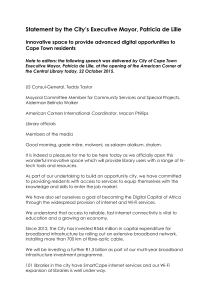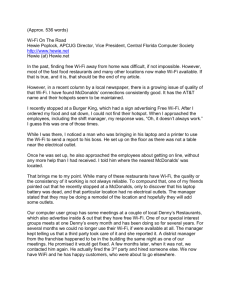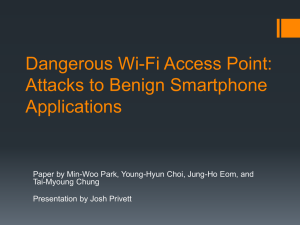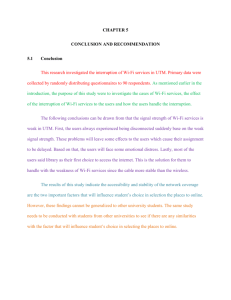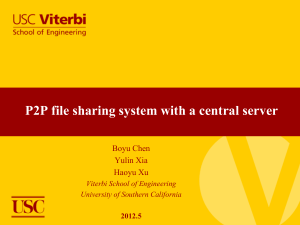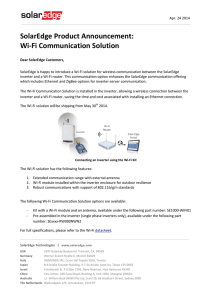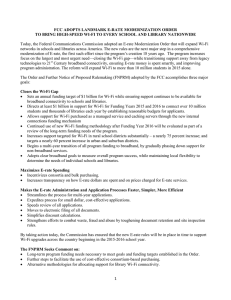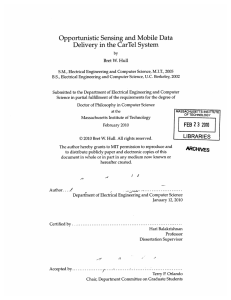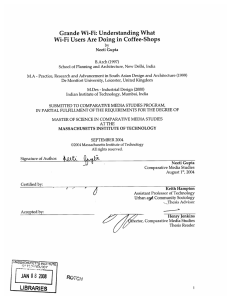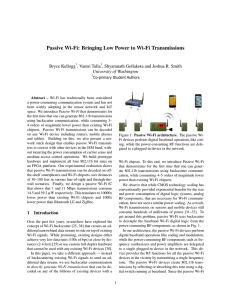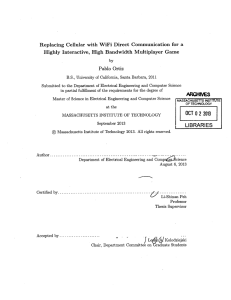City to expand digital inclusion project across the metro
advertisement
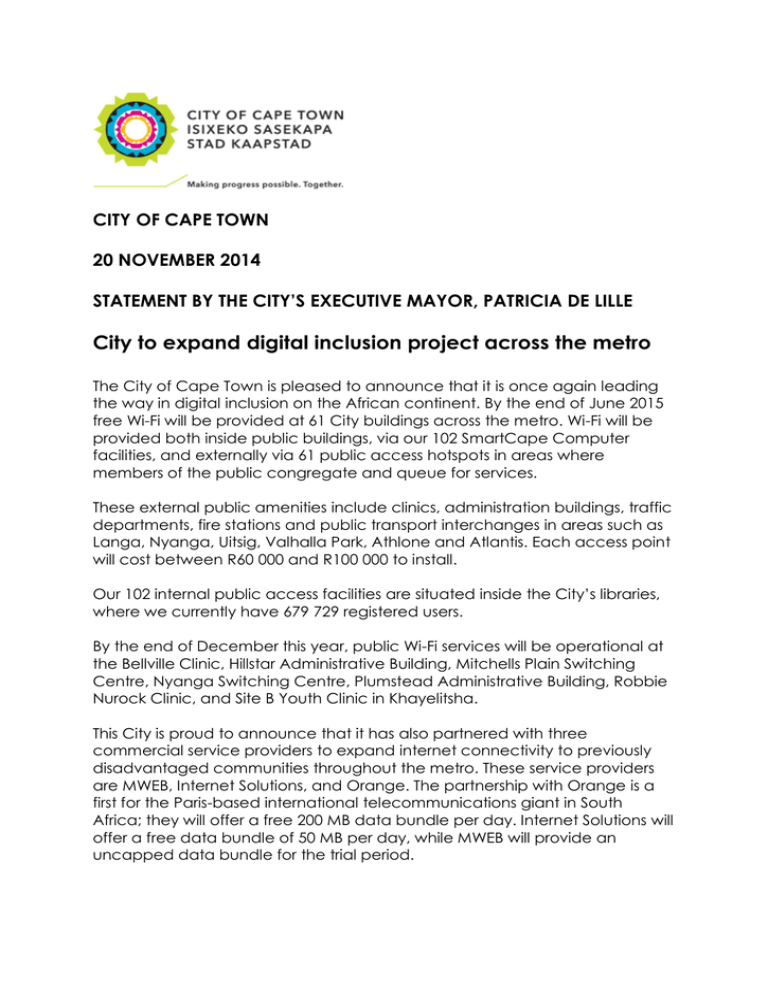
CITY OF CAPE TOWN 20 NOVEMBER 2014 STATEMENT BY THE CITY’S EXECUTIVE MAYOR, PATRICIA DE LILLE City to expand digital inclusion project across the metro The City of Cape Town is pleased to announce that it is once again leading the way in digital inclusion on the African continent. By the end of June 2015 free Wi-Fi will be provided at 61 City buildings across the metro. Wi-Fi will be provided both inside public buildings, via our 102 SmartCape Computer facilities, and externally via 61 public access hotspots in areas where members of the public congregate and queue for services. These external public amenities include clinics, administration buildings, traffic departments, fire stations and public transport interchanges in areas such as Langa, Nyanga, Uitsig, Valhalla Park, Athlone and Atlantis. Each access point will cost between R60 000 and R100 000 to install. Our 102 internal public access facilities are situated inside the City’s libraries, where we currently have 679 729 registered users. By the end of December this year, public Wi-Fi services will be operational at the Bellville Clinic, Hillstar Administrative Building, Mitchells Plain Switching Centre, Nyanga Switching Centre, Plumstead Administrative Building, Robbie Nurock Clinic, and Site B Youth Clinic in Khayelitsha. This City is proud to announce that it has also partnered with three commercial service providers to expand internet connectivity to previously disadvantaged communities throughout the metro. These service providers are MWEB, Internet Solutions, and Orange. The partnership with Orange is a first for the Paris-based international telecommunications giant in South Africa; they will offer a free 200 MB data bundle per day. Internet Solutions will offer a free data bundle of 50 MB per day, while MWEB will provide an uncapped data bundle for the trial period. The City is pleased to partner with these service providers in furthering our digital inclusion strategy and stimulating economic development in less advantaged areas. It is truly a sterling example of how progress can be made possible, together. We are currently investigating providing Wi-Fi on MyCiTi buses and are in the process of conducting a pilot project with an external entity. Information on this project with be forthcoming in due course. We will also be accelerating the digital inclusion project by providing broadband access through the Bandwidth Barn at Lookout Hill. This digital inclusion project forms part of our overarching objective of becoming the first truly digital city in Africa. Our brand new Wi-Fi provision has been made possible by the City’s investment in broadband fibre optic networks in line with its City's Universal Broadband Network strategy, which is geared towards rolling out broadband infrastructure throughout the metro. This forms part of the City’s R1,3 billion programme to complete the roll-out over the next seven years. In doing so we will realise our vision of facilitating access to high-speed internet in order to support economic development and expand opportunities to our residents. The City’s Telecommunications Department undertook a Proof of Concept trial in four areas in Khayelitsha and Mitchells Plain, namely Stocks & Stocks, Harare, Site C and Lentegeur. As part of the study, the City installed access point transceivers on City buildings and custom-built poles to provide Wi-Fi zones directly into informal dwellings. The initial plan was to install access points to create a wireless network capable of providing Wi-Fi to each home. However, upon commencing the technical feasibility proofing and having installed a number of these networks in the pilot areas, the City’s telecoms team came to the conclusion that in order to provide robust internet access directly into homes, individual connectivity boosters would need to be fitted to each house. This would not only have been costly to install, it would also have been complex to manage owing to a range of structural factors, as well as weather-related constraints and safety issues. It was also found that custom-building household access networks in this way results in a low number of users per access point. In addition, the deployment of such a network would be complex and too slow. The network would in time have become redundant, given the gradual proliferation of commercial mobile internet services. It was therefore decided that it is not financially viable or sustainable to provide internet connectivity to the home for these two communities using this approach. However, the service delivered at access points at City buildings has been widely used, and has proved to be both reliable and sustainable. The public Wi-Fi project demonstrates that the City’s fibre optic network has reached the point where it is robust and extensive enough to be leveraged off by the private sector, and can significantly benefit those areas that are currently poorly served with broadband connectivity. Broadband connectivity and digital inclusion are fundamental to creating an enabling environment for business development, economic growth and social cohesion. Our new public Wi-Fi provision is a prime example of how the private sector, government and the public can make progress possible, together. End Note to editors: for a full list of the areas in which Wi-Fi is available at external public amenities, please send a request to media.account@capetown.gov.za Issued by: Integrated Strategic Communication and Branding Department, City of Cape Town Media enquiries: Pierrinne Leukes, Spokesperson for the Executive Mayor – Patricia de Lille, City of Cape Town, Tel: 021 400 1302 or Cell: 084 272 7614, Email: Pierrinne.leukes@capetown.gov.za
